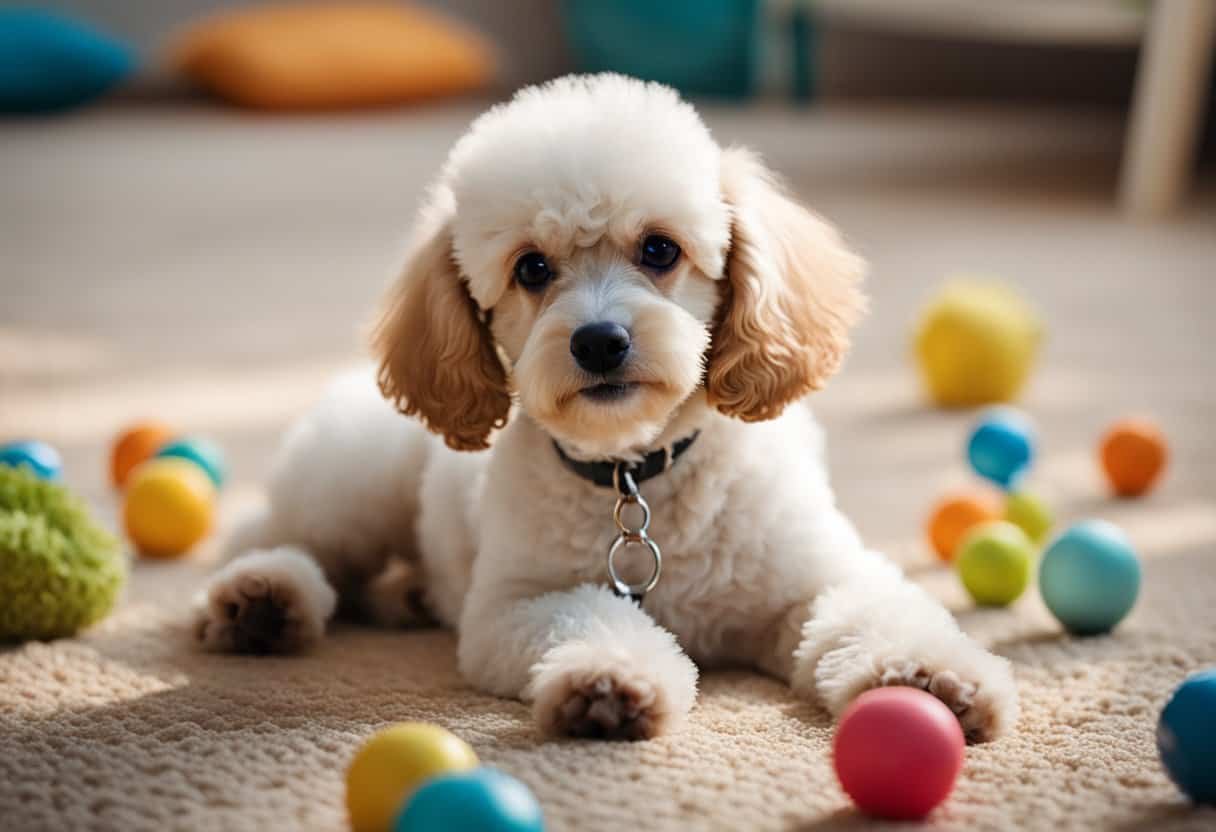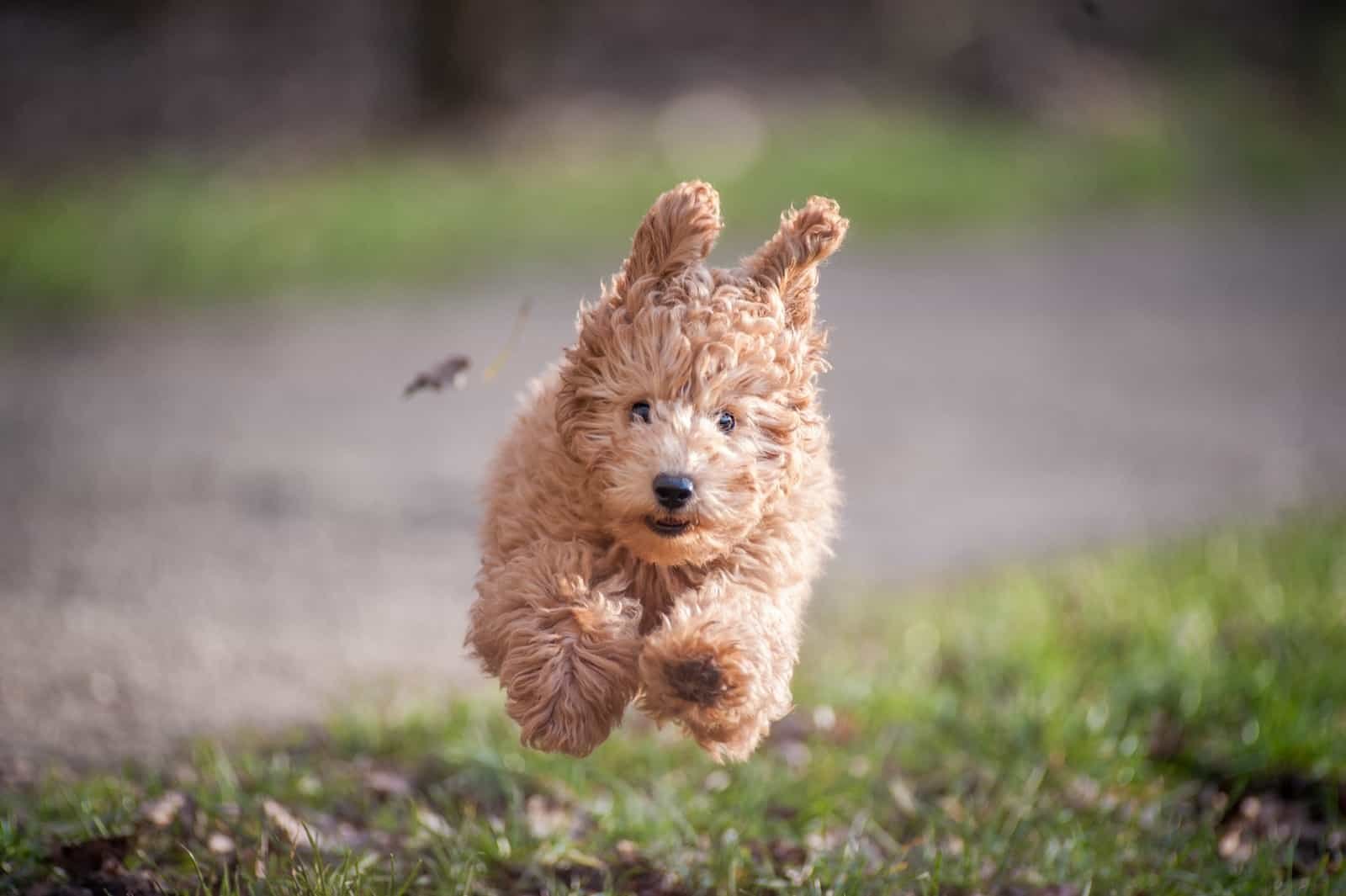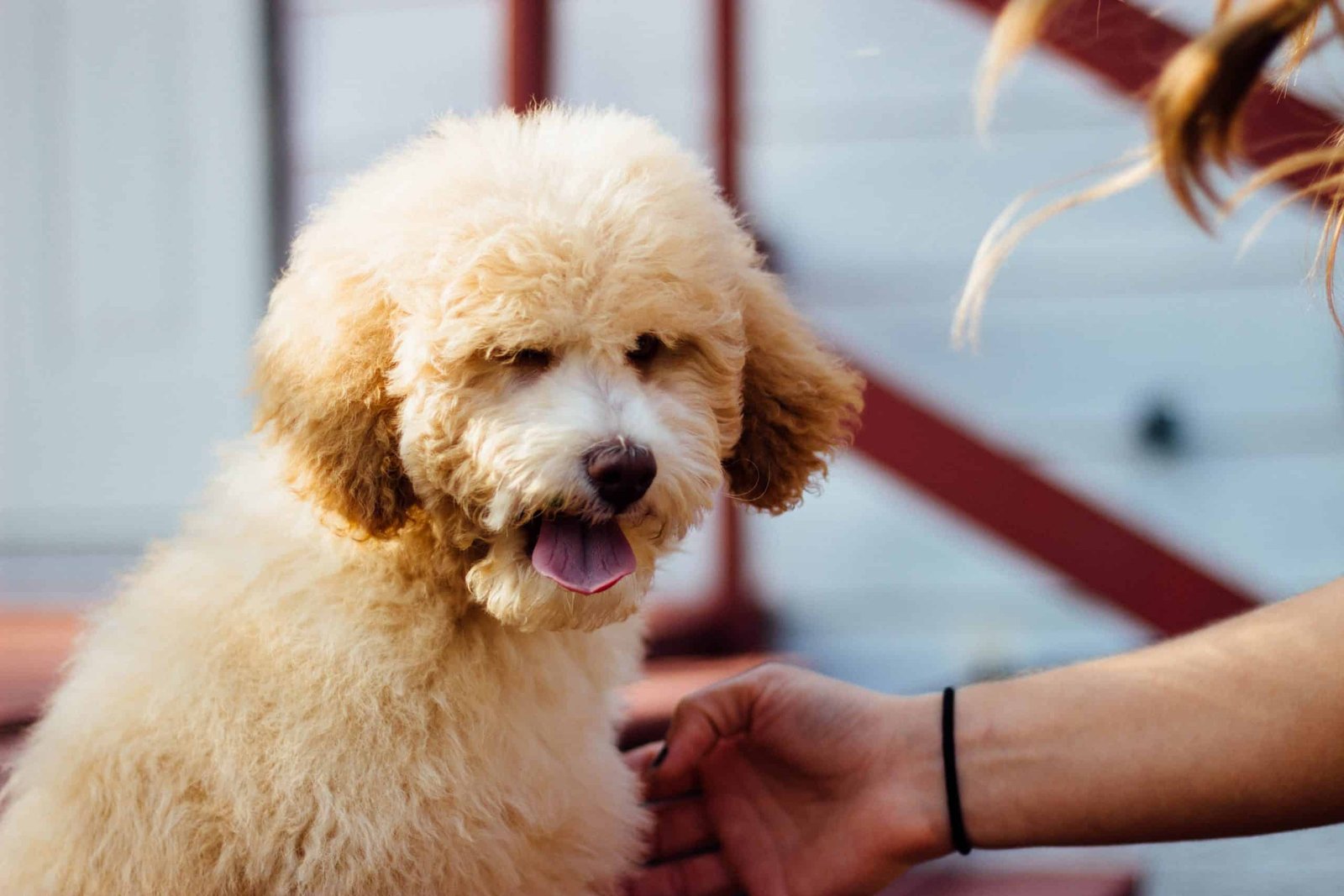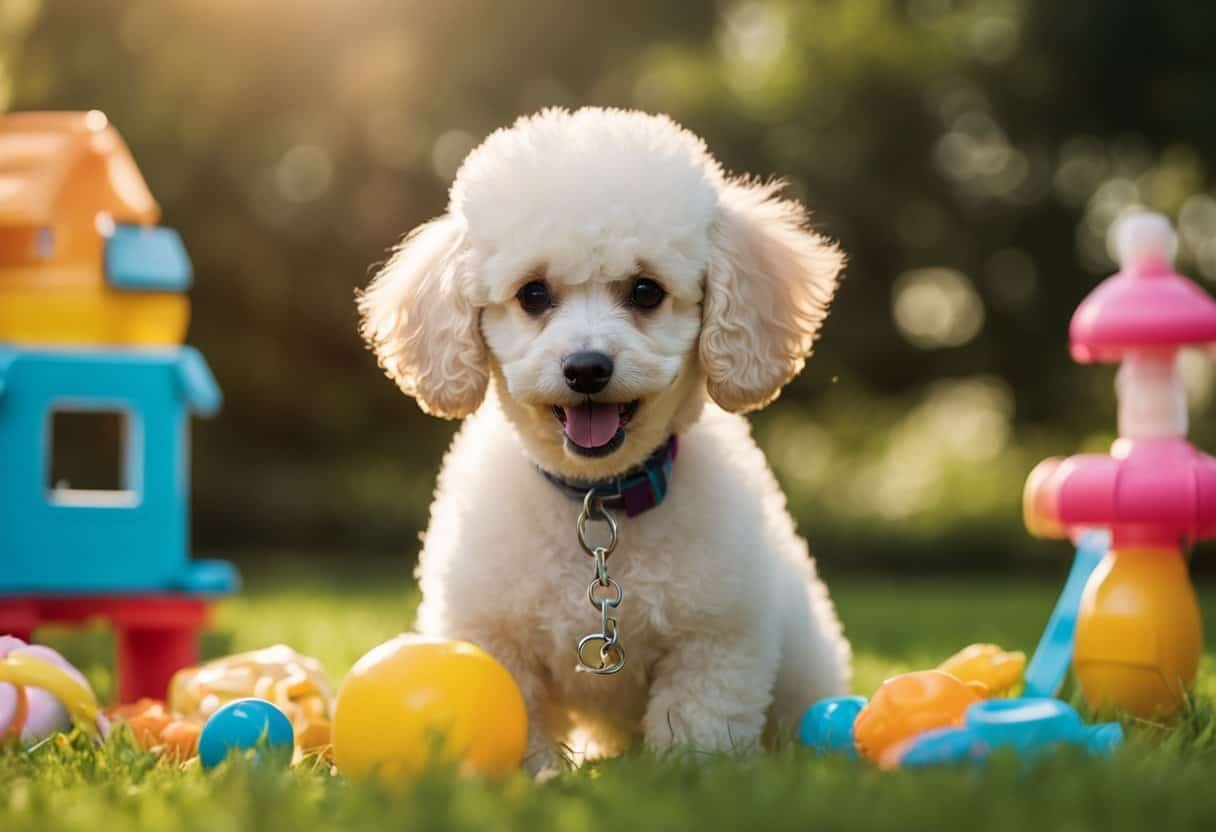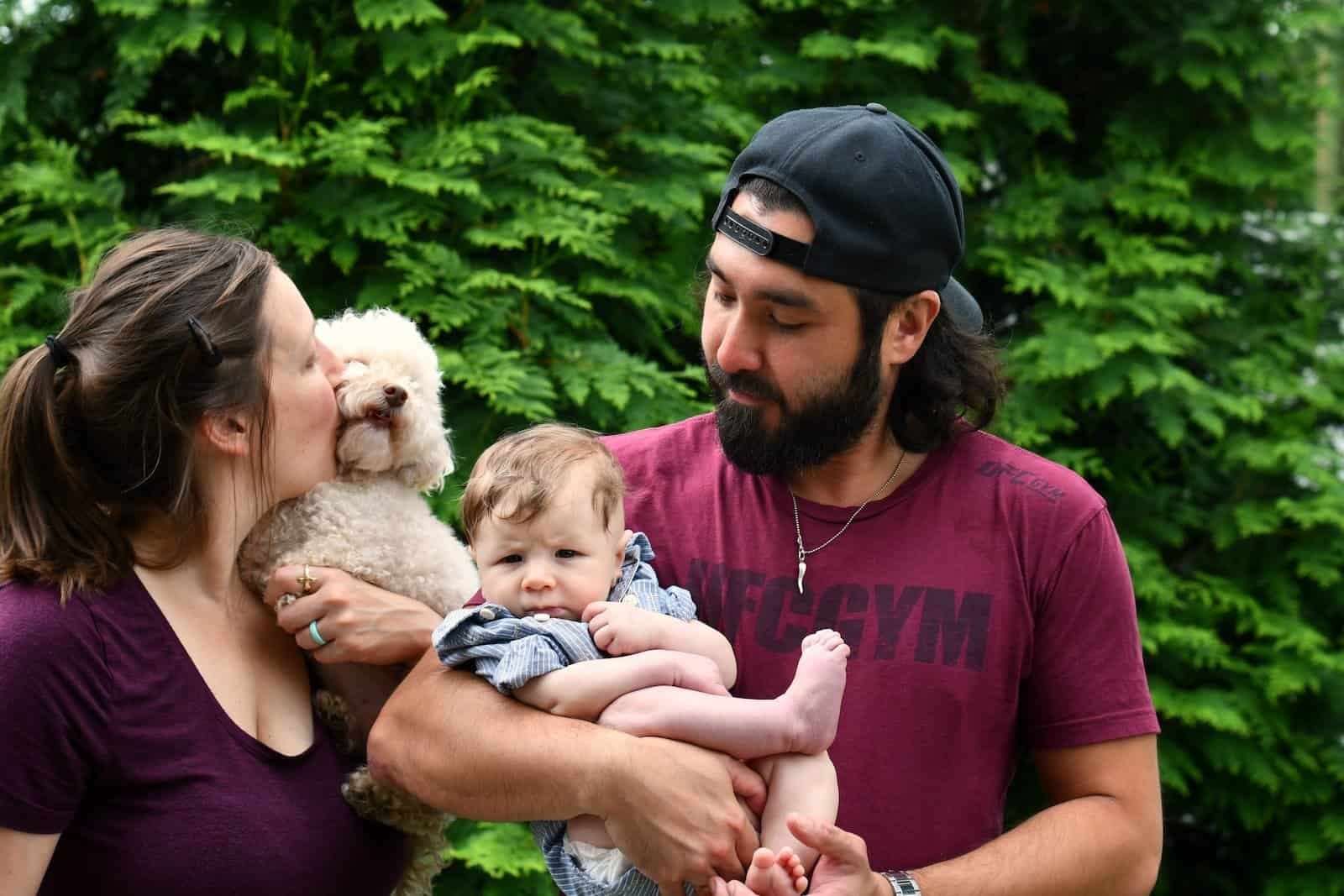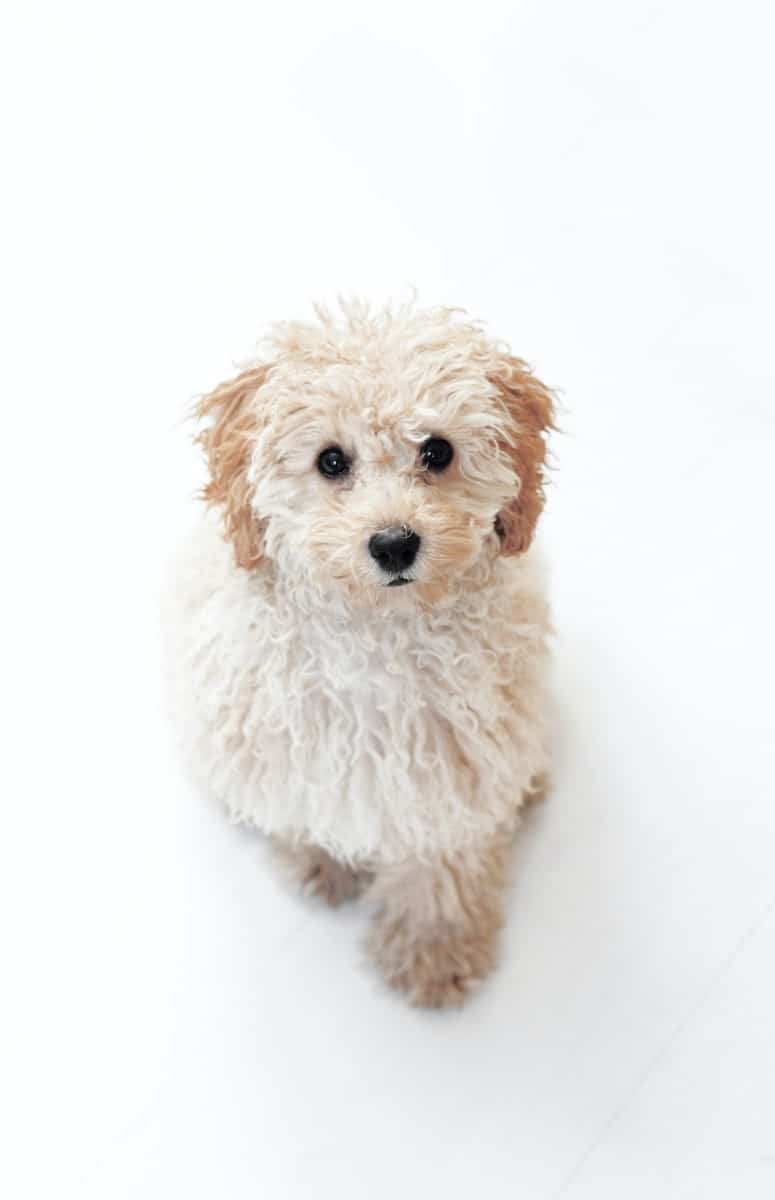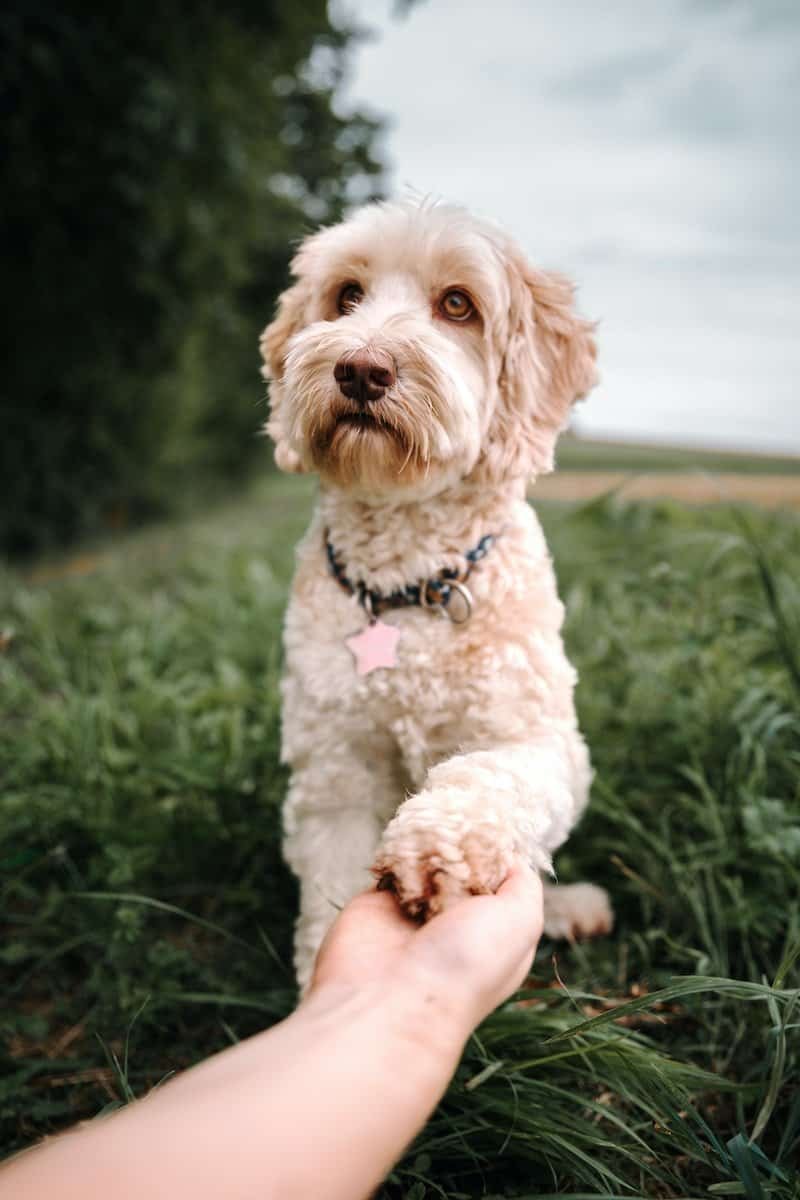
In the life of a poodle puppy, the first six months are a whirlwind of growth and learning.
During this time, your poodle puppy will experience rapid physical development along with significant behavioral changes.
Starting life as a tiny, dependent creature, they will grow into an active and curious youngster with their own distinct personality.
Understanding these developmental stages is crucial in providing the care and training that will help your puppy flourish.

Creating a nurturing home environment is foundational for your puppy’s well-being.
The early months lay the groundwork for your puppy’s future behavior and health.
Socialization, exposure to different sights and sounds, a consistent healthcare routine, and proper nutrition are all pivotal.
Balancing these needs with positive reinforcement training, ample exercise, and regular grooming will ensure your poodle puppy’s path to adulthood is smooth and joyful.
Key Takeaways
- Adequate socialization and training set the stage for positive behavior.
- Consistent healthcare and proper nutrition are vital for puppy development.
- Ensuring regular exercise and grooming promotes overall well-being.
Understanding Poodle Puppy Development
During the first six months of life, your Poodle puppy will undergo significant growth and development. This period is crucial for shaping their personality and future behavior.
From Birth to Two Weeks: Your puppy is blind, deaf, and toothless. The primary activities are feeding and growing. Human interaction is limited, but gentle handling helps with early socialization.
Two to Four Weeks: Eyes and ears open, and your puppy begins to explore their surroundings.
Introduce mental stimulation through various scents, sounds, and gentle play.
Four Weeks to Three Months: This is a rapid growth phase where coordination improves.
Begin basic training such as potty training and simple commands. It’s also the perfect time to establish a routine and introduce developmental milestones such as crate training.
| Age | Milestones and Tips |
|---|---|
| 3 to 4 Months | Teething begins. Offer appropriate chew toys. |
| 4 to 6 Months | Personality becomes evident. Encourage positive behavior. |
Three to Six Months: Socialization is key.
Introduce your puppy to different people, dogs, and environments.
Continue with consistent training, focusing on obedience and social manners.
Poodles are intelligent and typically respond well to training and mental stimulation.
This is also a prime time for personality traits to emerge.
Observe your puppy’s behavior to learn what they enjoy and what makes them uncomfortable.
Remember, each puppy is unique, and development can vary.
Keep your veterinary check-ups scheduled to ensure your Poodle is on track and to discuss any concerns about their growth and overall wellbeing.
Creating a Welcoming Home Environment

Creating a welcoming home environment for your Poodle puppy in the first six months takes patience and the establishment of a routine.
A sense of security and clear house rules will help ease your puppy’s transition into their new surroundings.
Safe Spaces and Crate Training
For your Poodle puppy, a safe space is essential.
Start with a comfortable crate that is spacious enough for your puppy to stand up, turn around, and lie down.
It’s important to fill it with soft bedding and a few chew toys for comfort.
Crate training should be a gradual process, encouraging your puppy to enter the crate on their own with treats and keeping it positive.
House-Training Basics
House-training begins with setting a consistent routine for meals, playtime, and potty breaks.
Limiting access to the entire home initially can prevent accidents and make this process smoother.
When your puppy does need to go, always guide them to the same spot outside; this builds a reliable habit.
Reward your puppy immediately after they eliminate in the correct place to reinforce good behavior.
The Importance of Socialization and Exposure
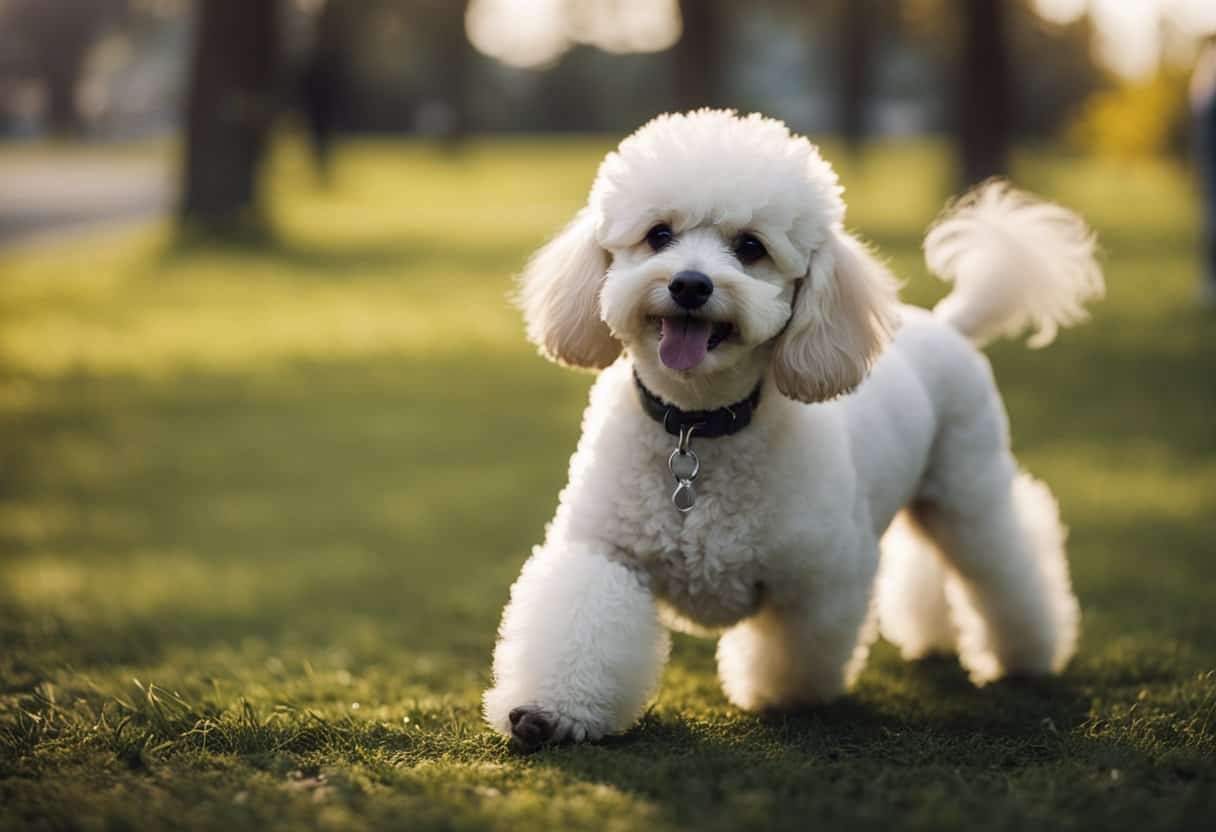
During the first six months of your Poodle puppy’s life, establishing a strong foundation through socialization and exposure to a variety of stimuli is crucial.
Socialization sets the stage for how well your puppy adapts to their environment, including interactions with other dogs, people, cats, and more, within the socialization window, typically from 3 to 14 weeks of age.
Introducing New People and Pets
It’s imperative to introduce your puppy to as many new people and pets as possible, especially during the socialization window.
Begin with controlled situations that ensure positive experiences for your puppy.
- People: Invite guests over frequently, allowing your puppy to interact with a wide range of individuals, including children and the elderly.
- Dogs & Cats: Schedule playdates with vaccinated and well-behaved dogs and cats, progressively exposing your puppy to different sizes, breeds, and temperaments.
Acclimatizing to Various Stimuli
Your puppy should be gradually introduced to a variety of sounds, objects, and weather conditions, ensuring they grow comfortable with everyday experiences.
- Sounds: Expose your puppy to different noises at a low volume initially, gradually increasing the volume over time. This includes traffic noises, household appliances, and loud music.
- Objects: Present various items to your puppy — everything from umbrellas to bags — to investigate and explore.
- Weather: Allow your puppy to experience different weather conditions like rain and sun gently. Protective gear can make this a more positive experience.
Healthcare and Vaccination Schedule
Ensuring the health of your Poodle puppy during the first six months is crucial for their long-term wellbeing.
A consistent vaccination schedule and healthcare plan, including the consideration of spaying or neutering, are foundational steps to protect your puppy.
Puppy Vaccinations and Preventatives
Your Poodle will need several vaccinations to protect against common diseases.
Starting from as early as 6 to 8 weeks, they should receive vaccines, at intervals of 3 to 4 weeks, until they are around 16 weeks old. Here is a simplified schedule to follow:
- 6 to 8 weeks: Distemper, parainfluenza
- 10 to 12 weeks: DHPP (vaccines for distemper, adenovirus [hepatitis], parainfluenza, and parvovirus)
- 16 to 18 weeks: DHPP, rabies
Beyond these basics, your vet may recommend other vaccines based on your puppy’s environment and lifestyle, such as Bordetella and leptospirosis.
It is also important to initiate a heartworm preventative and flea/tick medication at the appropriate age as recommended by your vet.
Spaying or Neutering Considerations
Spaying or neutering your Poodle can prevent unwanted pregnancies and offer long-term health benefits, including the reduction of certain cancers and the possibility of inflammation associated with reproductive organs.
The procedure is typically recommended before your puppy reaches six months of age, but you should discuss the optimal timing with your veterinarian, as they can provide guidance based on your dog’s specific health needs and the latest research.
Nutrition and Feeding Guidelines
Proper nutrition is crucial for your Poodle puppy’s growth and health.
You’ll need to follow a feeding schedule that supports their development and transitions them gradually from puppy food to adult food.
Weaning and Puppy Food
Weaning begins when puppies shift from their mother’s milk to solid food. This shift typically happens around the age of 4 to 6 weeks. During this phase, puppy food should be introduced.
Select a high-quality puppy kibble with a balance of protein, fats, and carbohydrates to foster healthy growth. Initial feeding might consist of four meals per day.
- 4-8 weeks: Softened puppy kibble for easy chewing.
- 2-4 months: Regular puppy kibble, portioned appropriately to prevent overfeeding.
Transition to Adult Food
The transition to adult food usually happens around the age of 6 months. Start mixing adult kibble with puppy food in increasing amounts over 7 to 10 days to allow your puppy’s digestive system to adjust.
- Day 1-3: Mix 75% puppy kibble with 25% adult food.
- Day 4-6: Equal parts puppy and adult food.
- Day 7-10: Mix 25% puppy kibble with 75% adult food.
A routine of two meals per day is typical for adult dogs, so begin to adjust feeding schedules accordingly during this transition. Remember to choose adult food that meets the nutritional needs of your Poodle’s size and activity level.
Training and Behavior Fundamentals
In the first six months of your Poodle puppy’s life, establishing clear behavior and training routines is critical. Key priorities include instating guidelines for appropriate elimination habits and managing typical puppy challenges like chewing. You should also introduce basic obedience training to set the stage for a well-behaved adult dog.
Potty Training and Chew Management
When you begin potty training, consistency is your best ally. Bringing your puppy to the same spot each time will help reinforce where it’s appropriate to relieve themselves.
Positive reinforcement is essential; reward your puppy with praise or treats immediately after they go potty in the correct location.
Potty Training Steps:
- Choose a designated potty area.
- Take your puppy out frequently: after waking up, after meals, and before bedtime.
- Celebrate successes with immediate praise and a treat.
Chew Management Tips:
- Offer a variety of chew toys to prevent boredom.
- Actively engage your puppy with their toys to create a positive association.
- Gently but firmly say “no” and give them a chew toy if they bite something they shouldn’t.
Teaching Basic Obedience and Commands
Laying the foundation for basic obedience helps you bond with your puppy and prevents future behavior problems. Start with simple commands like sit, stay, come, and down.
Employ positive reinforcement techniques including treats, praise, or play to reward your puppy’s compliance. Bite inhibition should also be taught at this stage to prevent problematic biting behavior in the future.
- Basic Commands to Teach:
- Sit – The first command to teach, useful to calm and focus your puppy.
- Stay – Important for safety and impulse control.
- Come – Crucial for recall and preventing runaway situations.
- Down – A step toward more advanced training and establishing respect.
Physical Activities and Exercise Needs
When raising a Poodle puppy, understanding and catering to their exercise and activity needs is crucial for their overall development. During the first 6 months, your puppy requires a balanced approach to physical activity that integrates both fun and structure.
Playtime and Exercise Routines
Your Poodle puppy will need daily exercise to support healthy growth, with the intensity and duration varying according to their age. A good rule of thumb is to provide 5 minutes of exercise per month of age, twice a day.
For instance, at 4 months, your puppy should enjoy two 20-minute sessions of physical activities daily. Activities can include:
- Fetching games to develop coordination and responsiveness
- Gentle tug-of-war to build muscle strength
- Short walks to explore and experience new stimuli
Ensure playtime incorporates mental stimulation, such as:
- Interactive toys
- Basic command training, like sit and stay
Leash Training and Outdoor Adventures
Begin leash training early to prepare your puppy for the outdoors. Start with short, positive sessions inside your home, gradually moving to a quiet outdoor area.
Reward your puppy with treats and praise to create positive associations. Once comfortable, expand your adventures to include:
- Visits to a dog park where they can socialize and encounter various stimuli in a controlled environment
- Short hikes on nature trails for varied sensory experiences and physical challenges
Grooming and Physical Maintenance
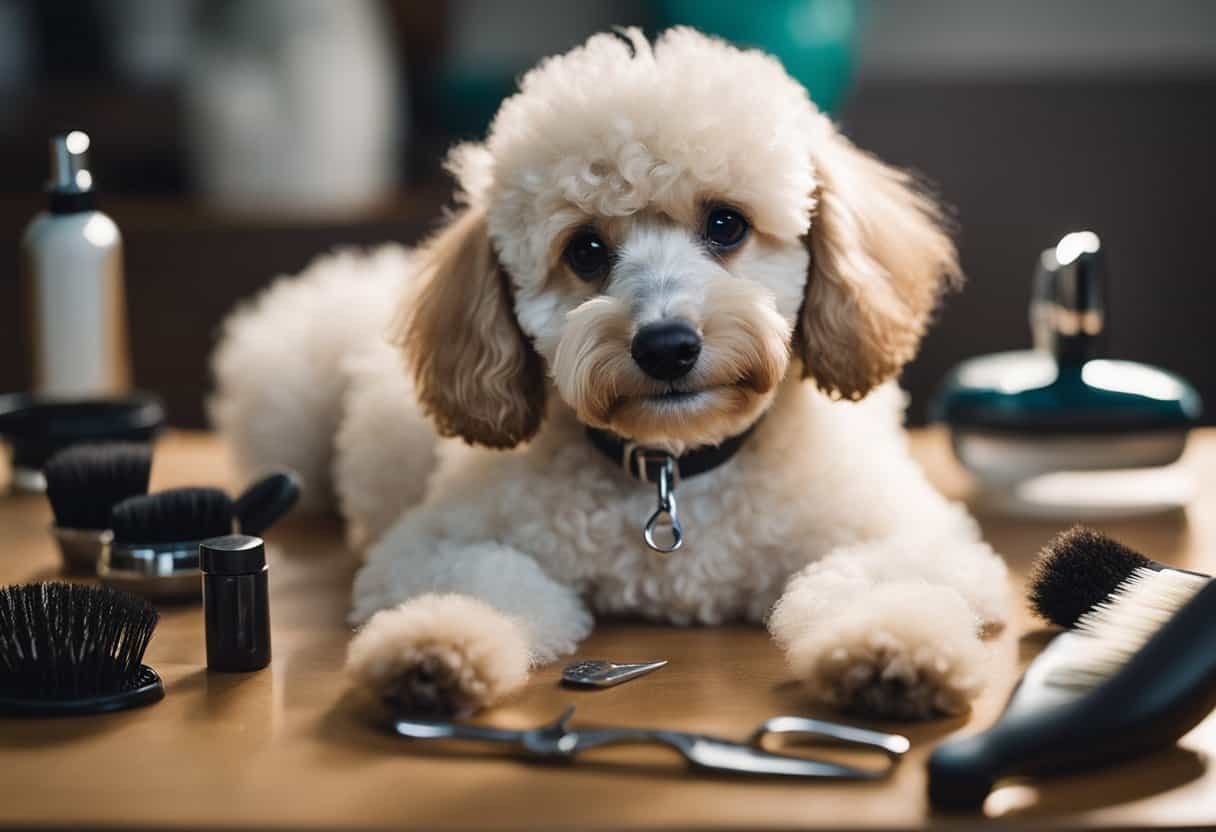
In the first six months, your Poodle puppy will require consistent grooming and physical maintenance to keep them healthy and comfortable. Proper coat care, nail trimming, as well as dental health and teething are essential aspects that you should pay attention to.
Coat Care and Nail Trimming
Your Poodle puppy’s coat needs regular brushing to prevent matting and to keep it clean. Begin by gently detangling the hair with a comb, starting from the ends and working towards the skin. Follow with a brush to remove loose hair and distribute oils, promoting a healthy, shiny coat.
For a more detailed process on grooming your Poodle’s face, you can learn about facial grooming here.
In addition to coat care, nail trimming is a crucial routine to establish early on. Overgrown nails can cause discomfort and potentially lead to health problems.
Using a suitable nail clipper for puppies, trim the nails carefully, avoiding the quick, which can cause pain and bleeding if cut.
Dental Health and Teething
Poodles will go through a teething phase, where they will lose their baby teeth, and their adult teeth will emerge. This process can cause discomfort, so providing safe chew toys will help alleviate some of that.
Regular teeth cleaning is also vital to prevent dental issues. You can start getting your puppy used to having their teeth brushed a few times a week, using a canine toothbrush and toothpaste.
Understanding the proper technique is important, and you can get guidance on brushing your Poodle’s teeth here.
Frequently Asked Questions
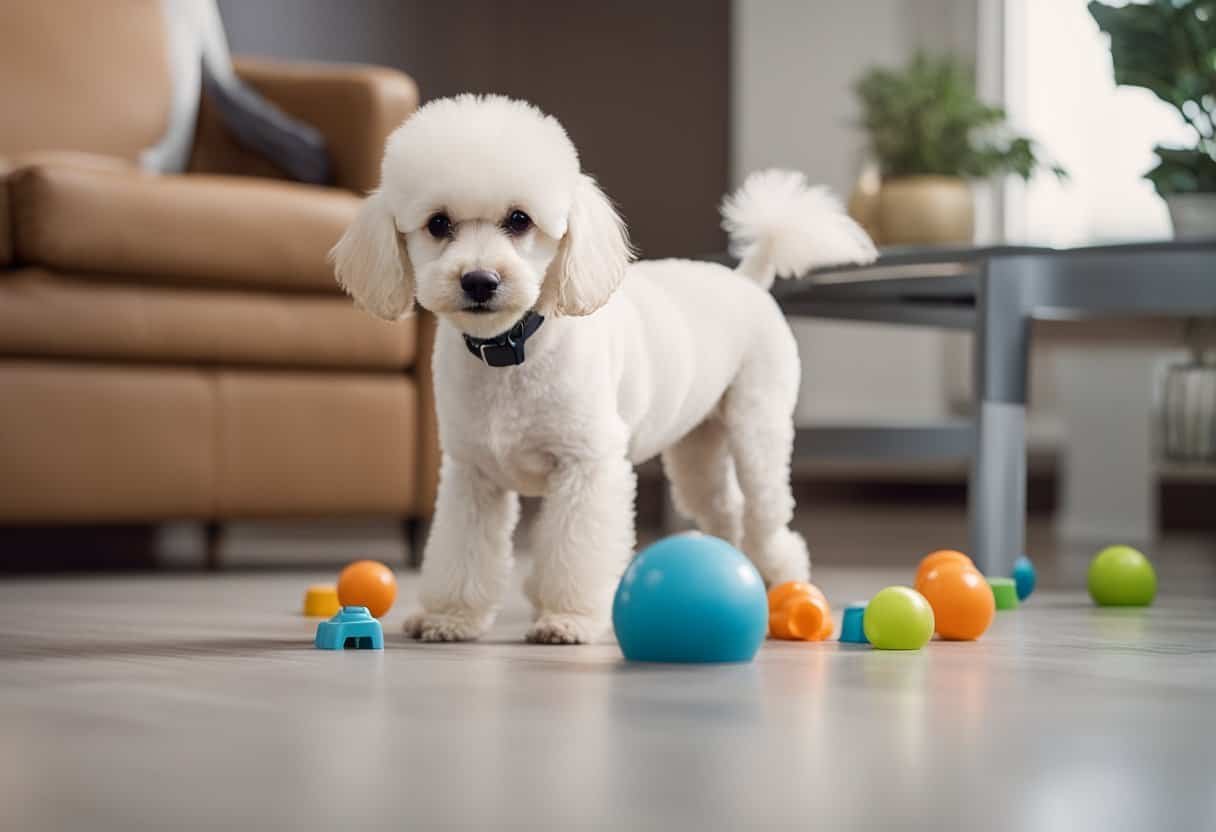
In this section, you’ll find targeted answers to common queries about raising and training your poodle puppy during its crucial first six months.
What are the key developmental milestones for a poodle puppy in the first 6 months?
During the first six months, your poodle should be developing social skills, learning basic commands like sit, stay, and come, teething, and starting to get a handle on potty training. Physical and behavioral changes will be evident as they grow from a dependent puppy into a more independent young dog.
How can you potty train a poodle puppy effectively within the first half-year?
Effective potty training involves consistency and positive reinforcement. Take your puppy outside to the same spot regularly, particularly after meals and naps, and reward them for doing their business outside. Crate training can also be part of an effective potty training strategy.
What are effective training techniques for a miniature poodle puppy in early stages?
Early training techniques should include short, positive training sessions that focus on basic commands. Use treats and praise to reward your miniature poodle for good behavior. Also, socialization with other dogs and people will help them become well-adjusted adults.
What should a 6-month-old poodle be expected to know in terms of training and behavior?
By six months, your poodle puppy should have a good grasp of basic commands such as sit, stay, and down. They should be well on their way to being potty trained. Also, they should exhibit proper social behavior around both humans and other dogs.
Can you describe the appearance and size of a standard poodle at 6 months old?
A standard poodle at 6 months old will be considerably larger than when they were a newborn puppy, with longer legs and a more graceful appearance. Their curly coat will be developing and may require regular grooming. Also, they should display a lively and intelligent expression.
What are the common challenges faced during a poodle puppy’s growth at various stages up to 6 months?
Common challenges include bite inhibition, teething, potty training, and separation anxiety.
Provide plenty of chew toys, establish a consistent routine, and create a safe, comforting environment to mitigate these challenges.
Ready to Adopt a Poodle?
Find poodle rescues and adoption organizations near you. Give a loving poodle their forever home.

